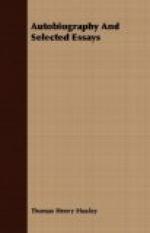Thus, without for a moment pretending to despise the practical results of the improvement of natural knowledge, and its beneficial influence on material civilisation, it must, I think, be admitted that the great ideas, some of which I have indicated, and the ethical spirit which I have endeavoured to sketch, in the few moments which remained at my disposal, constitute the real and permanent significance of natural knowledge.
If these ideas be destined, as I believe they are, to be more and more firmly established as the world grows older; if that spirit be fated, as I believe it is, to extend itself into all departments of human thought, and to become co-extensive with the range of knowledge; if, as our race approaches its maturity, it discovers, as I believe it will, that there is but one kind of knowledge and but one method of acquiring it; then we, who are still children, may justly feel it our highest duty to recognise the advisableness of improving natural knowledge, and so to aid ourselves and our successors in our course towards the noble goal which lies before mankind.
A LIBERAL EDUCATION [49]
The business which the South London Working Men’s College has undertaken is a great work; indeed, I might say, that Education, with which that college proposes to grapple, is the greatest work of all those which lie ready to a man’s hand just at present.
And, at length, this fact is becoming generally recognised. You cannot go anywhere without hearing a buzz of more or less confused and contradictory talk on this subject—nor can you fail to notice that, in one point at any rate, there is a very decided advance upon like discussions in former days. Nobody outside the agricultural interest now dares to say that education is a bad thing. If any representative of the once large and powerful party, which, in former days, proclaimed this opinion, still exists in the semi-fossil state, he keeps his thoughts to himself. In fact, there is a chorus of voices, almost distressing in their harmony, raised in favour of the doctrine that education is the great panacea for human troubles, and that, if the country is not shortly to go to the dogs, everybody must be educated.
The politicians tell us, “You must educate the masses because they are going to be masters.” The clergy join in the cry for education, for they affirm that the people are drifting away from church and chapel into the broadest infidelity. The manufacturers and the capitalists swell the chorus lustily. They declare that ignorance makes bad workmen; that England will soon be unable to turn out cotton goods, or steam engines, cheaper than other people; and then, Ichabod! Ichabod![50] the glory will be departed from us. And a few voices are lifted up in favour of the doctrine that the masses should be educated because they are men and women with unlimited capacities of being, doing, and suffering, and that it is as true now, as it ever was, that the people perish for lack of knowledge.




